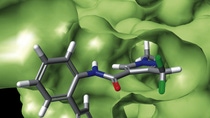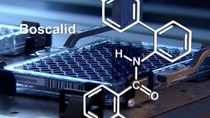Key benefits for farmers
- Unique mobility in the plant
- Control of a wide range of diseases in many crops
- State-of-the-art-formulations
- High effectiveness
- Global registration
Agriculture
Growers worldwide depend on safe and reliable tools for controlling diseases. Highly efficient, innovative fungicides are key for sustainably managing fungal diseases while also ensuring good quality and yields.
Xemium®, BASF's innovative active ingredient, combines two qualities: high intrinsic activity against a broad range of fungi and a unique mobility in the whole plant. This combination makes Xemium® the reliable partner for farmers’ longterm success.
Xemium® controls a broad spectrum of pathogens in many row crops and specialty crops. For farmers this means highly reliable and effective protection for their harvest.
Xemium® combines unique mobility with extraordinarily high intrinsic activity, leading to both long-lasting preventative and curative action. For farmers, this means more flexible spray timing.
Xemium®'s strong and long-lasting control of important fungal pathogens allows undisturbed plant growth to generate more yield. This yield increase effect has been proven by independent scientists.
Xemium®, as a fungicide partner in spray programs, improves produce quality because it effectively controls important primary diseases and also secondary pathogens, e.g. sooty mold in cereals.
Xemium® blocks the fungal respiratory chain with outstanding activity. This is one of the key factors contributing to its versatility and suitability for flexibly timing applications.The new pyrazole-binding technology enables Xemium® to very effectively block Complex II. This enzyme, which is also known as succinate dehydrogenase (SDH), plays a key role in cell respiration in fungi. Complex II supplies cells with energy, in addition to providing molecular building blocks for cell growth. These functions are disrupted by the SDH inhibitor (SDHI) Xemium®. Xemium® is not cross-resistant to fungicides with other modes of action. The extended pathogen spectrum opens up the opportunity to introduce Xemium® with a new mode of action in crops where carboxamides have not been used.
In 1974, BASF's first carboxamide Benodanil was introduced as an active ingredient for seed treatment. It was followed in 2003 by Boscalid, which has proven its success in cereals and specialty crops. Making optimal use of this chemical class – to develop a new active ingredient that perfectly complements the activity spectrum of carboxamides previously available – is a target we have achieved with the development of Xemium®.

